The Yakuza (1974)
Directed by: Sydney Pollack
Written by: Leonard Schrader, Paul Schrader, Robert Towne
Starring: Brian Keith, Herb Edelman, Ken Takakura, Robert Mitchum
HCF REWIND NO. 216: THE YAKUZA [USA/Japan 1974]
AVAILABLE ON DVD
RUNNING TIME: 107 min
REVIEWED BY: Dr Lenera, Official HCF Critic
George Tanner, an American living in Japan, is in big trouble with Toshiro Tono, a yakuza gangster over a business deal. When Tono kidnaps George’s daughter and her boyfriend, George has nobody else to turn to but Harry Kilmer, an old friend who had been stationed with him in Japan just after World War 2, but who now lives in America. Harry agrees, and sets out to find Ken Tanaka, an ex-yakuza member who owes Harry a favour because Harry saved his sister Eiko and her daughter just after the war. However, Harry and Ken are still at odds because Harry and Eiko once had a relationship which deeply offended Ken….
Sydney Pollack’s strange, melancholy picture The Yakuza uses what initially seems to be an American [though with heavy Japanese input] take on the popular Japanese yakuza [Japanese mafia] pictures of the time as a vehicle for exploring themes such as loyalty, debt and sacrifice in a way that makes for an extremely compelling, if undeniably odd, watch. At its centre is the idea of giri, a lifelong debt that traditionally can never be paid. It delves into the mindset and values of what is to many of us Westerners a strange, alien culture which is difficult to understand, but does it with respect. It certainly has its action, but it’s not really an action movie per se. Rather, it’s a very deep drama with action elements, perhaps overly wordy but very compelling, and it ends up being very quietly powerful. It’s one of my favourite movies from its year, and I’m horrified about occasional rumours that it’s going to be remade. The ending [remember, this is the 70’s] would no doubt be changed, for a start, and I doubt the remake would have neither the original’s intelligence nor its heart.
The script was co-written by brothers Paul and Leonard Schrader and based on Leonard’s experiences when he lived in Japan and even got partially involved with the local yakuza. Warner Bros. paid them the then-record sun of $325,000.00 for it, amazing considering the oddness of the project and it being written by people who were at the time unknowns [of course that would soon change, especially for Paul]. Lee Marvin was initially going to star with Robert Aldrich directing, but Marvin lost interest and was replaced by Robert Mitchum, who forced out Aldrich [they fell out on a previous film] and had him replaced by Sydney Pollack, though Martin Scorsese wanted to direct it too. Pollack brought in Robert Towne to re-write parts of the script and beef up the gangster element, while Japan’s Toei studios had a lot of input into the production, resulting in some of its stars having major parts. The eventual Japanese cut ended up being ten minutes longer than the cut released elsewhere, though the three extra scenes are ritualistic in nature and their significance would only be understood by Japanese audiences, the only major change resulting in Ken and Eiko meeting for the first time in twenty years a bit earlier in the story. The Yakuza did decent box office but became all-but-forgotten for many years despite the big names involved with it, though it does now have a considerable cult following.
The downbeat feel of the film you’re about to watch is immediately apparent from the sad, emotive theme music by Dave Grusin, which is a truly beautiful piece, rich in longing and nostalgia. Similar in effect to Bernard Herrmann’s famous Taxi Driver theme, it’s one of the greatest film themes that not enough people are familiar with. The film gets into its plot quite quickly, the very first scene throwing the viewer into the weird world of the yakuza, but it soon settles into a languid, laid-back mood, exemplified best by an early scene which gets through some heavy background information with amazing economy while being rich with subdued emotion. Harry has just arrived in Japan and, after visiting Wheat, another old buddy, goes off to see Eiko, the woman he was with twenty years ago but felt he had to leave when her soldier brother Ken came home. Wheat tells another guy about Harry and Eiko, and over shots of Harry walking through Japanese streets, the narration flows in and out of the soundtrack while that darned sad music plays over, allowing us to pick up on important facts like that Harry got penicillin for Eiko’s sick daughter, that Ken was so offended by his sister living with a white man that he went off to become a yakuza and never spoke to her again, and that Harry kept on proposing to Eiko, but not allowing us to hear everything. It’s so simple, so smooth and yet so rich in texture and feeling. I personally don’t feel that the director of Out Of Africa and Tootsie ever really made a bad movie, but he never made anything better than The Yakuza [though They Shoot Horses, Don’t They? comes close].
The plot gets quite complicated and you have to concentrate, something not always made easy by the length of some of the dialogue scenes, while the bursts of action tend to be short, brutal and with quite fast cutting that makes some of this film seem quite modern though of course this kind of thing isn’t generally done so well nowadays. A bloody encounter in a swimming pool is a near masterpiece of atmospheric lighting and precise, almost formalised staging, so much so that it really seems like the film is being directed by a Japanese, not an American. The climactic swordplay is superbly staged and realistic: no flashy moves or lengthy duels, just convincing viciousness, in keeping with samurai and yakuza films where the aim is to dispatch your opponent as quickly as possible, not have a ten minute battle with them. Of course Ken Takakura, a star of yakuza films and the guy who plays Ken, has the lion’s share of the action, and that’s as it should be. Robert Mitchum may ostensibly be the film’s star, and he certainly has the most screen time, but his character is soon lost in a web of deceit and in a culture he only begins to truly understand at the end. A modern remake would probably have the character demonstrate lots of fancy martial arts moves, but in this one Harry is mean with a gun but for much of the time just seems to blunder through. Mitchum has rarely used his laid-back, world-weary yet still very tough persona to better effect, but Takakura matches him, his character a rigid, coiled spring and a perfect foil for Mitchum’s. The two make a great team.
Set in a Japan which was beginning an economic boom and only just getting fully recovering from World War 2, The Yakuza contrasts Western and Eastern cultural values, classical Japanese traditions with modern ones, yet the sad, powerful tale it relates has deep emotions which are universal. The story finishes on an act of self-sacrifice by which initially seems strange and even revolting, yet we are made very aware that it’s by someone who has ruined somebody else’s past, present and future. The romantic element is heart-rending, partly because it’s so underplayed, though there’s a nice contrast between the love that once was and can never be recaptured of Harry and Eiko, and a love that begins to blossom between two younger characters but is cruelly cut down before it can properly flourish. However, the real heart of the film is the complex relationship between Harry and Ken, two men full of pain who hurt each other and pretty much wreck each other’s lives [though far more in one case], but who in the end have the deepest friendship and love two people can possibly have. They are also both, in a way, obsolete, possessing values that the younger generation mostly don’t have, and maybe shouldn’t have. There are similarities with the themes of many Westerns here, which I’m sure was intentional. The Yakuza is set in Japan, one of the most movie-photogenic countries in the world, but is photographed here in a way by Kôzô Okazaki in a way that partly de-glamourises it, while the story shows us a lot of strange Japanese cultural values, but in a way where you could set this story in quite a few other environments with only a few changes.
Grusin’s superb score, which is often restricted to simple, traditional Japanese sounds, is intelligent throughout. For the action towards the end, most composers would either have no music or try to musically enhance the excitement of the scene. Quentin Tarantino would have a really cool track that you’d probably remember after you’ve seen the film. Grusin and his director are aware that, deep down, what is being enacted on screen is not actually very cool at all, even if it may look it. All we hear are some traditional Japanese instruments, and it’s enough. The Yakuza has this kind of intelligence running through it. They could have so easily gone for far easier options in its story, the way it’s told, and the way it finishes, and probably made the film a popular hit in the process, but instead they went the other way. It’s a film that doesn’t compromise, yet also possesses extreme sensitivity and ends up being quietly heartbreaking. As a character says:
“When an American cracks up, he opens up the window and shoots up a bunch of strangers. When a Japanese cracks up, he closes the window and kills himself”.

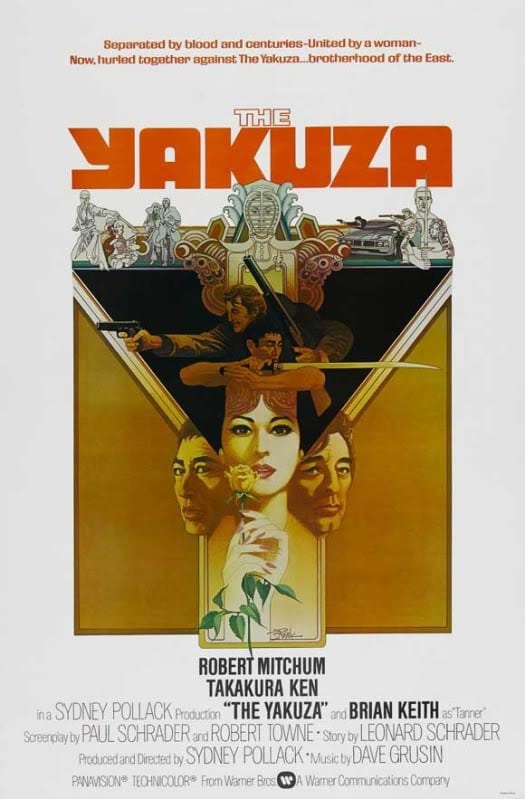
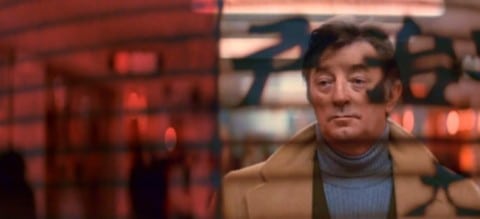
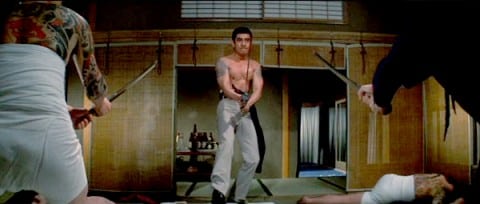



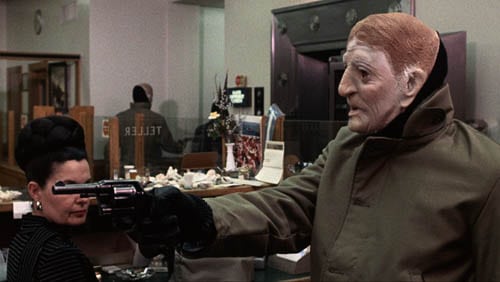
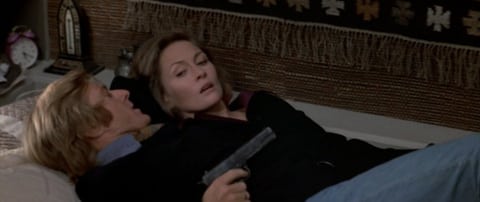
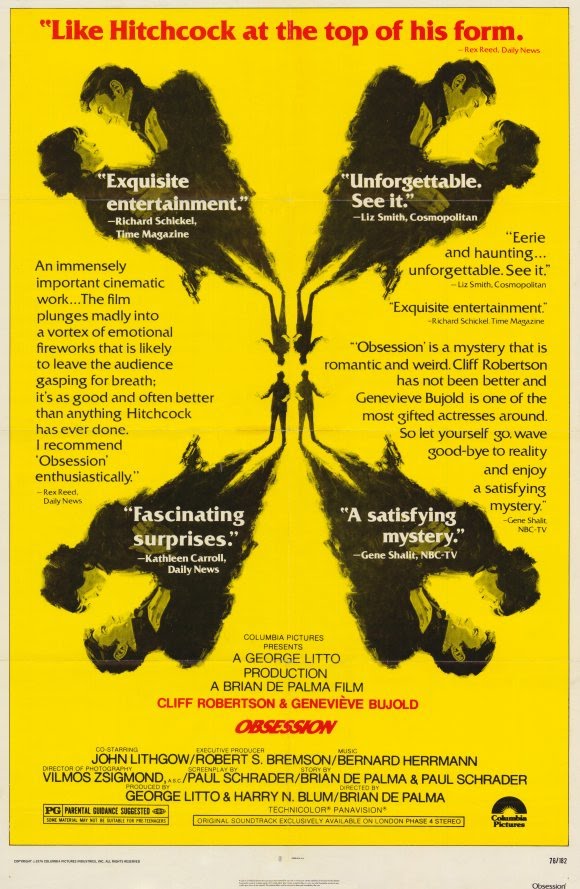
Be the first to comment